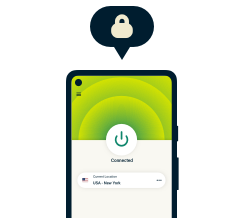A leaked email or phone number might seem harmless, until AI gets involved.
Cybercriminals aren’t just stealing data—they’re selling it on the dark web, where scammers use AI to turn stolen information into highly convincing social-engineering attacks. Using leaked personal details and files, AI can clone voices, generate deepfake videos, and craft phishing emails so realistically that they fool even the most cautious people.
Scammers can use fragments of your leaked data to impersonate someone you trust, manipulate you into revealing more information, or even take over your accounts.
So how does stolen data end up on the dark web? And more importantly, how can you protect yourself before AI-powered scammers target you? Let’s go through what you need to know.
Concerned about AI scams? Identity Defender’s ID Alerts tool keeps you one step ahead by scanning the dark web for your personal information for sale. Get real-time notifications if your data appears in a breach, so you can take precautions. ID Alerts is free for ExpressVPN subscribers in the U.S.
What are AI-powered scams?
AI-powered scams use artificial intelligence to make cybercrime more convincing, scalable, and harder to detect. Scammers use AI to analyze stolen data, create realistic impersonations, and automate attacks. This allows them to target individuals with hyper-personalized scams that feel real enough to fool friends and family and even systems.
What kind of information do scammers use?
Cybercriminals don’t always need passwords or financial details to launch an attack. With AI, they can exploit seemingly harmless personal data to build convincing scams. Some of the most valuable pieces of information include:
- Email addresses: Used to send AI-generated phishing emails that mimic legitimate contacts.
- Phone numbers: Scammers use AI-powered robocalls or deepfake voice messages to impersonate real people.
- Social media profiles: Public posts, comments, and shared interests help scammers craft believable fake identities.
- Biometric data: AI can use leaked voice recordings or facial scans to bypass security measures like voice authentication.
- Leaked credentials: Even old or partial login details from a leaked database can help criminals piece together your digital identity.
Hackers don’t just wait for stolen data to become useful—they actively search breach databases for high-value targets. They use dark web data leak search tools to look for specific credentials that could unlock sensitive accounts, like corporate logins or financial details.
Even if your leaked data doesn’t seem important, scammers can piece together multiple leaks over time, creating a full profile that makes you more vulnerable to AI-powered scams.
How cybercriminals use dark web data for AI-powered scams
Data leaks used to be a numbers game. Hackers would steal massive amounts of personal information and hope a fraction of it could be exploited. But AI has changed that. Now, cybercriminals can analyze stolen data from a leak database to automate scams at scale, making them more efficient and harder to detect.
One of the most dangerous tools scammers use is a data leak search engine. These dark web search tools allow criminals to quickly find high-value targets based on stolen credentials, such as email addresses linked to financial accounts or leaked phone numbers that can be used for identity fraud.
With just a few clicks, scammers can cross-reference leaked data with social media profiles and online activity, creating a detailed digital footprint of their victims. AI takes this even further by using stolen data to craft hyper-personalized phishing emails, generate deepfake videos, and automate social engineering attacks.
Deepfake scams
AI-powered deepfake technology can generate realistic voices, videos, and images, allowing scammers to impersonate real people with stunning accuracy. Scammers only need a few seconds of stolen audio from social media, a phone call, or leaked databases to start a deepfake scam.
Once they have a sample, AI can recreate a person’s voice to make fake phone calls. This has been used in high-profile CEO fraud cases, where deepfake voices trick employees into wiring large sums of money. In one case, an AI-generated deepfake of a company executive scammed a UK-based energy firm out of 243,000 USD.
Deepfake video scams are more elaborate but more convincing. Cybercriminals can also create realistic but entirely fake footage of someone saying or doing things they never actually did, for different purposes, such as misinformation campaigns and extortion schemes where scammers threaten to release fabricated videos unless victims pay a ransom.
AI-crafted phishing emails
Phishing scams have been around for years, but AI has made them far more sophisticated. Instead of sending generic scam emails, cybercriminals now use dark web data leak databases to generate hyper-personalized messages that feel authentic.
AI analyzes leaked personal data—including names, locations, and past communications—to craft emails that mimic a victim’s writing style, known contacts, and even specific topics of interest. This makes phishing attacks far more believable than traditional scams.
For example, a leaked email and travel itinerary could allow AI to generate a fake email from an airline, claiming there’s been an issue with a flight. Since the details seem accurate, the victim is more likely to click malicious links, reset passwords on fake websites, or unknowingly share login credentials.
AI-powered phishing has become a serious threat, with nearly 3.4 billion phishing emails sent every day. The combination of stolen data and AI-crafted messages makes these scams difficult to spot and easy to fall for.
AI-driven social engineering
Social engineering relies on manipulation rather than hacking, and AI has made it even easier for scammers to deceive people. Cybercriminals use leaked personal details—such as past addresses, family names, or social media posts—to pretend to be someone you trust.
AI-powered bots can engage in real-time conversations, posing as friends, coworkers, or customer support representatives. These bots analyze responses, adjust their tone, and build trust before asking for sensitive information like banking details, passwords, or two-factor authentication codes.
In 2024, scammers used AI-generated voices and videos to persuade an employee at a Hong Kong company to transfer 25 million USD to fraudulent accounts. The employee believed he was on a multi-person video call, but in reality, every participant was a deepfake avatar.
With AI automating these scams, criminals don’t need direct access to your bank account or password. They just need enough leaked personal data to make their deception believable. This is why detecting and stopping these scams is harder than ever.
Why most people don’t realize their data has been leaked
Most people don’t know their personal information has been exposed until it’s too late. Unlike high-profile hacks that make headlines, many data breaches go unnoticed because they don’t immediately affect the victim. Instead, the stolen data is quietly sold on dark web marketplaces, where cybercriminals can buy it in bulk and use it for fraud, scams, and identity theft.
Hackers don’t always act on stolen information right away though. They often collect and sell personal details months or even years after a breach, making it difficult to trace back to the source.
Once your data is out there, it can be traded multiple times across data leak sites and underground forums, where scammers piece together information from different breaches to build detailed profiles of potential victims.
Even major companies don’t always disclose breaches right away. Some businesses delay reporting cyberattacks, while others may not even realize their databases have been compromised until the data appears for sale online. This means your personal information could already be on the dark web—without you ever being notified.
Take the quiz: How much is your data work on the dark web?
How to check if your data is on the dark web
If your personal information has been leaked, it’s likely circulating on the dark web. Thankfully, you can use data leak lookup tools to help you find out.
A data leak lookup is a tool that scans publicly known breach databases to check if your email, phone number, or other personal details have been exposed. These tools can reveal whether your information has appeared in past breaches, helping you take steps to secure your accounts before scammers exploit your data.
Many people check for data leaks once and assume they’re safe. But new breaches happen all the time, and hackers often don’t release stolen data immediately. Instead, they sell, trade, or bundle leaked information with other databases, meaning your data could appear in a new breach long after the initial attack.
Real-time monitoring is essential because a single exposed detail can lead to bigger risks. For example:
- If your email is leaked, scammers may send AI-powered phishing emails pretending to be from trusted sources.
- If your phone number is exposed, cybercriminals can attempt SIM swap attacks or use AI-generated voice calls to impersonate someone you know.
- If partial login details are leaked, attackers may use credential stuffing, trying combinations of known passwords to break into your accounts.
Your personal information could already be on the dark web—don’t wait to find out the hard way. Identity Defender’s ID Alerts monitors data breaches in real time, notifying you the moment your credentials are found in a leak. With early warnings, you can change passwords, enable stronger security, and prevent identity theft before scammers strike. ID Alerts, part of our identity protection tools, is free for ExpressVPN subscribers in the U.S.
How to stay ahead of AI-powered scams
You don’t have to wait until you become a target—there are ways to stay ahead of cybercriminals and protect your personal data before it’s used against you.
Here are some best practices to protect your information from AI-powered scams:
- Limit your public profile exposure: Be mindful of the information you share on social media. Cybercriminals use small details—like your birthday, job, or travel plans—to make scams more convincing. It’s best to keep your accounts private and only allow people you know to follow you.
- Use a password manager: Strong, unique passwords for every account make it harder for hackers to gain access, even if some of your credentials are leaked. Use a password manager to help you create strong passwords.
- Enable multi-factor authentication (MFA): A second verification step adds an extra layer of protection against unauthorized logins.
- Avoid oversharing online: Even seemingly harmless details, like answering quizzes or sharing personal interests, can be used in AI-driven scams.
- Regularly check for data leaks: Don’t assume your information is safe. Continuous monitoring with tools like ID Alerts helps you stay ahead of cybercriminals.
ExpressVPN’s ID Alerts is a proactive data leak monitoring tool that notifies you immediately if your personal information appears in a new data breach. It continuously scans the web for new exposures of your email, phone number, or other sensitive details, including dark web marketplaces and hacker forums.
Here’s how ID Alerts works:
- Dark web monitoring: ID Alerts scans the dark web for stolen credentials linked to your email, checking against known breach databases.
- Real-time notifications: If your personal data appears in a breach, you’ll get an instant alert, giving you time to take action before scammers do.
- Detailed breach insights: ID Alerts provides information on what was leaked and where it was found, helping you assess the risk level.
- Easy-to-follow security steps: When a breach is detected, ID Alerts guides you through securing affected accounts, changing passwords, and strengthening privacy settings.
- Continuous protection: Unlike manual searches, ID Alerts keeps working in the background, so you’re always informed of new threats.
Want extra protection for your data? Alongside ID Alerts, Identity Defender also features a Credit Scanner and Data Removal tool. Credit Scanner monitors your credit report for unauthorized activity, alerting you to suspicious loan applications or credit inquiries that could indicate identity theft. Data Removal helps you regain control of your personal information by requesting the deletion of your details from data broker sites that sell your information online. Get access to all of Identity Defenders tools for free if you’re an ExpressVPN subscriber in the U.S. with a 2-year plan.
FAQ: About stolen data
What are AI-powered scams?
AI-powered scams involve cybercriminals using artificial intelligence to create highly convincing fraudulent activities. These scams include generating deepfake videos or voice recordings to impersonate real people, crafting hyper-personalized phishing emails that mimic trusted sources, and automating social engineering attacks to manipulate victims. AI allows scammers to target individuals more effectively, making fraudulent messages, calls, and online interactions appear more legitimate and difficult to detect.
How do cybercriminals use stolen data in AI-driven fraud?
Cybercriminals leverage stolen personal information, such as emails, phone numbers, and social media content, to train AI models that enhance scams. With access to leaked data, AI can generate phishing emails that sound authentic, mimic writing styles, and personalize scams to specific individuals. AI-powered chatbots and deepfake technology further enable scammers to impersonate real people, making fraud more convincing and scalable.
What is a deepfake scam?
A deepfake scam uses AI to create highly realistic but fake images, videos, or audio recordings. Scammers use deepfake technology to impersonate trusted individuals to deceive victims into transferring money or sharing sensitive information. This can include business executives, family members, or government officials. In some cases, AI-generated voices have been used to trick employees into making unauthorized payments, and manipulated videos have been deployed in blackmail or misinformation campaigns.
How can I protect myself from AI-powered scams?
To stay safe from AI-driven scams, be cautious of unexpected communications, especially those requesting personal information or urgent action. Always verify emails, calls, or messages by contacting the sender through official channels. Enable two-factor authentication to secure accounts, use strong passwords, and avoid oversharing personal details on social media. Regularly monitor financial and online accounts for unusual activity. Using tools like ID Alerts can also help detect if your information has been exposed in a data breach before scammers use it against you.
How does personal data end up on the dark web?
Stolen data from breaches is often sold on dark web forums and marketplaces where cybercriminals buy and trade personal information. Hackers leak email addresses, phone numbers, passwords, and financial details, which are later used for identity theft, phishing scams, and fraud. Even seemingly harmless data can be pieced together with AI to create more convincing attacks. Since breaches are often not disclosed immediately, many people don’t realize their information is already being circulated.
How can I check if my personal data is on the dark web?
The best way to check if your personal information has been leaked is by using Identity Defender’s ID Alerts. ID Alerts continuously scans dark web marketplaces and breach databases for stolen credentials linked to your email or phone number. If your information is found in a leak, you’ll receive real-time notifications with details on what was exposed and steps to secure your accounts before scammers take advantage of it. ID Alerts is free for ExpressVPN subscribers in the U.S.

30-day money-back guarantee























